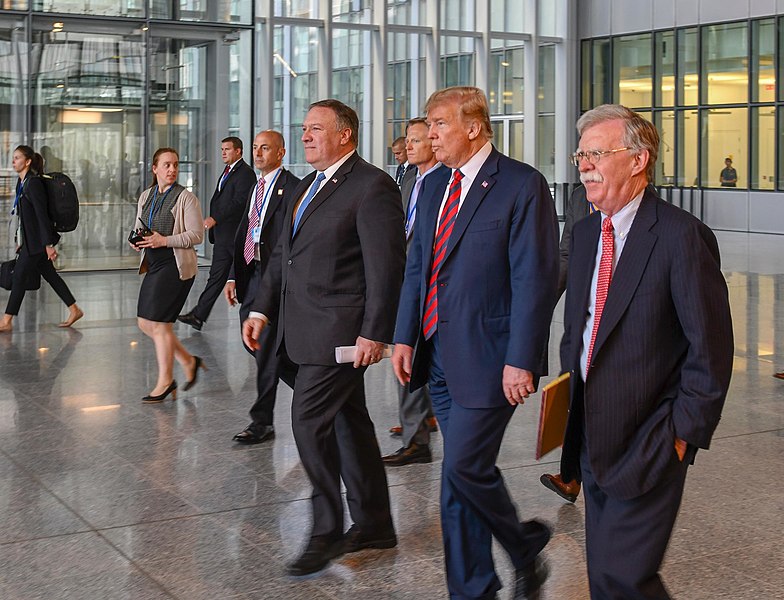There were a great many differences between President Barack Obama’s June 2009 Cairo speech and the address delivered on Jan. 10 in the same city by Secretary of State Mike Pompeo. As Pompeo repeatedly stated, the administration of U.S. President Donald Trump has rejected both the spirit and the substance of Obama’s attempt at outreach to the Muslim world. And in almost all respects, the repudiation of Obama’s stands on Iran, and on the conflict between Israel and the Palestinians, has been to the benefit of American interests.
But one other difference should trouble even those who cheered Pompeo’s rhetoric about America being a “force for good,” his tough line about Iran and his full-throated endorsement of Israel’s right to defend itself, in addition to the importance of Arab and Muslim nations recognizing its legitimacy. It’s that we know that although Pompeo and National Security Advisor John Bolton have been the ones running U.S. foreign policy since they both took on their current jobs last April, they aren’t the ones making all the decisions.
Even veterans of his administration have admitted that Obama’s Cairo apologia for America’s response to 9/11, coupled with his attempt to downplay the importance of radical Islamist ideology and terrorism, was a colossal blunder that accomplished nothing. His analogy between the Holocaust and the plight of the Palestinians (accompanied by Obama’s refusal to visit Israel on the same trip) also made it clear that his quest for more “daylight” between the United States and the Jewish state was not merely a figure of speech. That, too, failed to advance the peace process.
Obama’s Cairo speech can also be seen as the open salvo in his campaign to appease the Islamist regime in Iran that emboldened and enriched its theocratic leaders and encouraged them in their quest for regional hegemony.
The symbolism involved in the secretary’s repudiation of Obama’s speech in the same city where he spoke nearly 10 years ago was clearly irresistible to Trump’s team. As Pompeo pointed out, the administration comprehends the malevolent influence of Iran, and its withdrawal from the nuclear deal and the re-imposition of sanctions has the potential to reverse the gains Tehran was handed by Obama. It is also willing to stand with Israel rather than foolishly try to “save it from itself.” And, unlike Obama, it understands that the choices in countries like Egypt and Saudi Arabia isn’t between autocrats and democrats, but between unsavory but useful allies and Islamists who would also be even worse human-rights offenders.
But two years after January 2017, it’s time to acknowledge that Obama is gone, and that as much as they inherited a disaster, Trump and his team now own the situation in the Middle East.
That’s why Pompeo’s pledge that the United States will not cease to work to “expel every last Iranian boot” from Syria has to leave America’s allies scratching their heads, wondering how Washington can achieve that goal after it has pulled every last American boot out of the same country. Merely encouraging Israel to defend itself doesn’t alleviate the threat on its northern border. America’s Kurdish allies, who rightly worry about being abandoned by Trump to the tender mercies of Erdoğan’s genocidal intentions, are similarly perplexed. Frankly, so is Erdoğan, who can’t be blamed for wondering what’s going on after Bolton’s much-needed rebuke of the Turks’ stand towards the Kurds seemed to have contradicted the Ankara autocrat’s impression that Trump was willing to let him do as he likes.
The tension between Pompeo’s hardheaded realism and Trump’s neo-isolationist instincts remains unresolved. Trump deserves some credit for the victories won over ISIS after the stalemate that Obama presided over. But Pompeo is right the about the need for America to be steadfast in its efforts to resist Iranian influence and to stay the course in the fight against ISIS, which is far from over even if it involves the kind of “nation-building” Trump despises.
Yet the precedent of the Syrian withdrawal undermines Pompeo’s ability to pursue his agenda of American strength. Trump’s susceptibility to the influence of Russia, which he remains committed to appeasing in Syria, and Turkey—a bad actor that is a potential threat to the Kurds, hostile to Israel and an unreliable ally against Iran—has put at risk the accomplishments of the president’s first two years in office, and everyone in the region knows it. If Trump really wants to withdraw from the Mideast, then it will be possible to argue that there little difference between his moves and Obama’s failures.
As long as Pompeo and Bolton will there to clean up Trump’s messes, it is still possible to claim that this administration is vastly better than that of Obama with respect to defending U.S. interests, as well as solidifying the alliance with Israel. Those who argue that Trump’s Syria move completely invalidates all of the positives of the last two years, such as the withdrawal from the Iran deal and the U.S. embassy move to Jerusalem, are exaggerating. Still, it’s no good pretending that Trump’s unpredictability doesn’t cast a broad shadow over U.S. foreign policy that no speech by Pompeo—no matter how good—can erase.


























